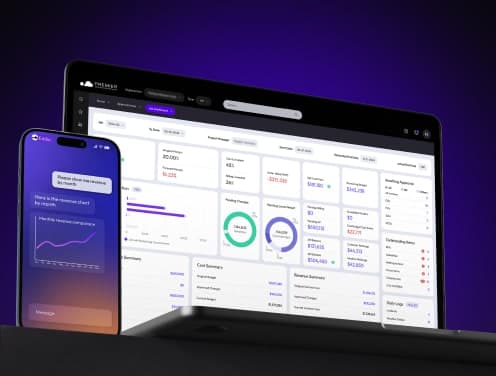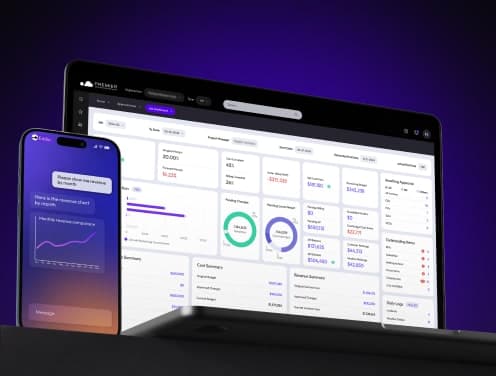
Cybersecurity Challenges and Solutions for Large Construction Firms
In an era where digital threats loom larger than ever, the construction industry finds itself navigating treacherous cybersecurity waters. With an increasing reliance on technology and a wealth of sensitive data at stake, large construction firms are ever more vulnerable to cyberattacks. Understanding the unique challenges they face is critical in addressing these vulnerabilities effectively.
Ransomware, phishing, and the exploitation of IoT devices have emerged as some of the most pressing cybersecurity threats in this sector. Coupled with a lack of cybersecurity awareness and over-reliance on third-party vendors, construction firms become attractive targets for malicious actors. Recognizing these factors is essential for developing comprehensive cybersecurity strategies tailored to the industry's specific needs.
This article delves into the current cybersecurity landscape for large construction firms, outlining key threats and the factors that make them susceptible. It also provides actionable solutions, from employee training to enhanced vendor management, aimed at fortifying the construction industry against the rising tide of cyber risks.
Current Cybersecurity Landscape in the Construction Industry
The construction industry is currently facing significant cybersecurity challenges, ranking as the most targeted sector for cyberattacks, with an average of 226 incidents annually. Many construction companies still use outdated technology, making them vulnerable to cyber threats such as ransomware and phishing attacks. The use of temporary work locations and a transient workforce further hinders security, amplifying exposure to cyber risks.
Financial repercussions from cyber incidents can be severe, affecting supply chains, disrupting critical project operations, and damaging client trust. With recent regulatory mandates, construction firms must now promptly disclose cybersecurity incidents, increasing pressure to enhance their defense strategies.
To strengthen their cybersecurity posture, construction companies should focus on modernizing their digital technology, enforcing multi-factor authentication, and implementing comprehensive employee training programs to mitigate phishing attempts and social engineering threats. Awareness of third-party and supply chain attacks is critical, as these often exploit weak links in the network. Proactive steps, such as assessing third-party risks and improving coordination with vendors, can help minimize vulnerabilities and protect intellectual property.
Key Cybersecurity Threats
The construction industry ranks as the highest targeted sector for ransomware attacks, with cybercriminals exploiting the sector's reliance on digital platforms. Phishing emails serve as a primary delivery method for these attacks, aiming to compromise critical systems. Fraudulent wire transfers and data theft are prevalent, with attackers using social engineering to trick employees into unauthorized transactions. Sensitive information like project blueprints and financial records amplifies the sector's vulnerability.
Ransomware Attacks
Ransomware attacks involve hackers encrypting important data and demanding payment, posing severe consequences for projects with strict deadlines. The construction sector has been the top target in two of the last three years, often due to inadequate cybersecurity plans. Outdated security measures allow cybercriminals to exploit vulnerabilities in legacy systems and software.
Vulnerabilities of IoT Devices
Insecure network connections in IoT devices make construction environments susceptible to unauthorized access and data breaches. Lack of encryption during data transmission means sensitive information can be intercepted easily. Inadequate authentication mechanisms further increase the risk, emphasizing the need for best practices to secure these devices.
Phishing and Social Engineering Attacks
Social engineering and phishing scams are common in the construction industry, targeting online financial transactions. Cybercriminals impersonate authority figures to deceive employees into executing fraudulent wire transfers. The industry is especially vulnerable to such fraud due to the vast sharing of confidential data. Proactive employee training is crucial to mitigate these risks.
Factors Making Construction Firms Attractive Targets
The construction industry faces significant cybersecurity challenges due to its longstanding avoidance of stringent data privacy and security regulations. Many construction firms operate on outdated technology, lacking necessary firewalls and protections against evolving cyber threats. Additionally, the interconnected nature of construction projects, with numerous subcontractors and suppliers, creates multiple entry points for potential cyberattacks. The reliance on digital tools further broadens the attack surface for cybercriminals. Limited cybersecurity plans and insufficient employee training make these companies prime targets for ransomware and phishing attacks.
Rich Data Repositories
Construction firms are attractive targets for cybercriminals seeking sensitive information, including proprietary construction plans and intellectual property. Data theft is common, with hackers aiming to steal valuable designs and confidential employee or client information, threatening the company’s competitive edge. The dark web market for personal information of customers and vendors, such as banking details and social security numbers, further incentivizes these cyberattacks. Without adequate safeguards, construction companies face serious liability implications and significant reputational damage following breaches.
Limited Cybersecurity Awareness
A large portion of the construction workforce lacks awareness of cyber threats, increasing the risk of phishing and business email compromise (BEC) attacks. Regular employee training is essential to help workers recognize and avoid common cyber threats within the construction industry. However, inadequate security measures and a lack of dedicated IT staff contribute to the vulnerability of construction firms. Many companies have not effectively addressed cybersecurity vulnerabilities, with about 40% of contractors feeling unprepared to mitigate these risks.
Dependency on Third-Party Vendors
The dependency on vendors and supply chain partners introduces additional cybersecurity risks, as these entities often have access to sensitive data or critical systems. Effective risk management strategies are needed to identify vulnerabilities within these extended network relationships. Conducting thorough due diligence when selecting third-party vendors is crucial to ensure they meet the necessary standards for protecting sensitive data. The reliance on multiple subcontractors increases the potential for cybercriminals to exploit less secure partners through supply chain attacks, leading to significant business disruptions.
Importance of Employee Training and Awareness Programs
Employee training and awareness programs are crucial for equipping construction workers with the knowledge to recognize and respond to cyber threats. Knowledgeable employees are more likely to report suspicious activities or incidents promptly, enabling swift action to mitigate potential threats. Regular training sessions reinforce good cybersecurity practices and address emerging threats, making training an ongoing necessity.
Prioritizing cybersecurity training helps construction companies maintain a positive reputation, as clients and partners appreciate their commitment to safeguarding shared information. Understanding common tactics used by hackers, such as social engineering attacks, empowers employees to better protect themselves and the organization.
Overall, consistent and comprehensive training fosters a culture of cybersecurity awareness, reducing the risk of cyber incidents and reputational damage.
Vendor and Supply Chain Management
Construction companies must conduct thorough due diligence when selecting third-party vendors to ensure robust security practices are in place. Effective vendor and supply chain management is key to enhancing cybersecurity resilience, minimizing the risk of successful cyberattacks, and protecting sensitive data. Adhering to established cybersecurity frameworks is crucial, particularly for firms engaged in government contracts.
Identifying and Assessing Vendor Risks
Construction companies need robust procedures for vendor risk management to evaluate the security posture of third-party suppliers effectively. Conducting detailed due diligence on vendor cybersecurity practices and past performance can substantially reduce risks associated with third-party relationships. Including stringent cybersecurity requirements in vendor contracts, such as right-to-audit clauses and hold-harmless agreements, helps limit liability and manage supply chain risks.
Implementing Secure Supply Chain Practices
Regular security audits of the supply chain are essential for identifying and mitigating vulnerabilities. Using encrypted communication methods, like VPNs or SFTPs, ensures the protection of sensitive information exchanged with partners. Intrusion detection systems help monitor network traffic for suspicious activities, while data protection clauses in contracts reduce the risk of supply chain attacks. Regular data backups enable quick restoration of essential information during cyber incidents, minimizing downtime and operational disruptions.
Physical Security Measures
Physical security is crucial for construction firms to protect against unauthorized access, theft, and vandalism. Construction sites are particularly exposed to physical threats, making robust security defenses essential. Effective measures include installing perimeter fencing and gates to restrict access, creating a first line of defense against intruders.
Cyber-physical attacks, targeting equipment or systems like HVAC or access controls, pose significant risks. It's vital that construction firms employ a comprehensive strategy combining physical and digital security measures to ensure site safety and security.
Safeguarding Construction Sites
The construction industry relies heavily on interconnected digital systems, making it a target for cybercriminals. Cyber threats such as ransomware attacks and phishing emails can cripple operations, emphasizing the need for employee training in cybersecurity. Construction companies should also adopt secure communication methods like VPNs and SFTPs to protect sensitive information.
Social engineering scams further highlight the necessity for ongoing cybersecurity training. Construction firms may also consider cyber insurance to mitigate financial losses from cyber incidents, offering a buffer against the unique risks faced in their sector.
Access Control Systems
Access control systems are pivotal for preventing unauthorized entry into construction sites and safeguarding sensitive data. Implementing these systems ensures that only authorized personnel can reach critical areas, thus reducing cybersecurity risks. Integrating access control with cybersecurity monitoring tools enhances response capabilities to potential cyber threats.
Moreover, secure communication channels associated with access-controlled systems are essential for maintaining trust with supply chain partners. Combining these systems with technical safeguards contributes to a comprehensive cybersecurity strategy for construction environments.
Cybersecurity Frameworks and Standards
Effective cybersecurity frameworks and standards are crucial for construction firms to safeguard their operations and sensitive data from cyber threats. The cybersecurity framework serves as an essential tool for managing cybersecurity risks and enhancing resilience. By incorporating cybersecurity clauses in contracts and conducting regular audits, construction firms can ensure compliance with robust standards, especially when dealing with subcontractors and third-party vendors. Employee training on cybersecurity awareness is a valuable investment, transforming a workforce into a robust defense mechanism against cyber threats.
Cybersecurity Framework
Cybersecurity framework provides a structured approach to managing cybersecurity threats within the construction sector. By implementing this framework, construction firms can adopt proactive measures, such as regular risk assessments and incident response planning, which bolster resilience against cyber incidents. The framework also fosters a cybersecurity-aware culture within organizations, elevating their defense mechanisms and enhancing stakeholder confidence in the firm's data protection capabilities.
ISO/IEC Standards
Adopting ISO/IEC standards allows construction companies to systematically identify and manage cybersecurity risks, ensuring resource allocation is aligned with risk levels. Compliance with these standards equips firms with comprehensive cybersecurity policies, crucial for managing vulnerabilities linked to technological advancements like IoT devices. Essential practices such as network segmentation and regular firmware updates further secure critical systems. Additionally, robust backup solutions are imperative to mitigate the effects of ransomware attacks, underscoring the importance of maintaining regular data backups.
Proactive Cybersecurity Strategies
Construction firms should proactively invest in cybersecurity to safeguard their assets against evolving threats. Engaging cybersecurity experts can offer tailored solutions, helping firms tackle unique industry challenges effectively. Regular testing of backup recovery procedures is crucial for business continuity and should not solely rely on outsourced IT providers. Firms must prioritize vendor and supply chain management to enhance resilience and minimize successful cyber attacks.
Multi-Factor Authentication
Multi-factor authentication (MFA) is essential to prevent unauthorized access, making it a mandatory requirement by many cyber insurance policies. MFA provides an additional security layer, requiring users to verify their identity through multiple methods. High-risk access points like remote access, webmail, and privileged accounts should particularly employ MFA. Adhering to the principle of least privileges alongside MFA further strengthens a construction company's cybersecurity posture against threats.
Regular Software Updates and Patch Management
Regular software updates and patch management are vital in defending against the latest cyber threats. Keeping software and other systems updated with the latest patches addresses known vulnerabilities, enhancing construction firms' security. Without regular updates, construction companies risk higher vulnerabilities to cyberattacks. Implementing updates is a critical component of a robust cybersecurity program that mitigates potential risks.
Development of Incident Response Plans
Incident response plans must outline procedures for detecting, containing, mitigating, and recovering from cyberattacks. This ensures a swift and effective response during cybersecurity incidents. Key actions may include notifying insurers, law enforcement, and vendors, and instructing employees not to interfere with mitigation efforts. Designating a lead person in incident response ensures clear leadership. Collaborating with cybersecurity consultants can help tailor an incident response plan for a construction company's specific needs.
Cyber Insurance as a Risk Mitigation Tool
Cyber insurance is a crucial tool for construction firms to mitigate the risks associated with cyberattacks. These policies vary widely in coverage and exclusions, so consulting with a licensed insurance professional is essential to find a policy that addresses specific needs. This is particularly important given the potential financial and reputational damage that can result from cyber incidents.
Implementing strong cybersecurity practices enhances the effectiveness of any cyber insurance policy. A comprehensive approach includes employee training to recognize threats like phishing attacks, thereby reducing vulnerability. Such proactive measures can safeguard a company's operations, reputation, and financial standing.
In the event of a cyberattack, cyber insurance supports quick, effective response strategies. This helps minimize operational disruptions and potential reputational damage. By investing in both comprehensive cybersecurity protocols and tailored insurance, construction businesses better position themselves to handle cyber challenges effectively.
Actionable Recommendations for Large Construction Firms
Large construction firms must adopt strategic measures to bolster their cybersecurity posture. Implement the cybersecurity framework to identify, protect, detect, respond, and recover from cyber threats efficiently. Establish stringent cybersecurity protocols for vendors and subcontractors, addressing data protection standards in contracts to mitigate supply chain attack risks. Employee training programs are crucial for enhancing awareness and preparedness against cyber intrusions. Deploy robust network security solutions, like firewalls and encryption, to combat unauthorized access and malware. Regular data backups are essential to minimize the impact of ransomware attacks and facilitate data recovery, ensuring operational continuity.
Enhance Cybersecurity Culture
Building a strong cybersecurity culture in construction companies involves comprehensive employee training programs. This training should raise awareness about cyber threats and underscore employee responsibilities in protecting sensitive information. General awareness sessions can help employees identify phishing emails and create strong passwords, significantly reducing cyber attack risks. Role-based training that focuses on specific job responsibilities enhances understanding of unique cyber risks, improving readiness against threats. Incident response training empowers employees to recognize and respond effectively to incidents, minimizing potential damage. Regular education sessions about evolving cyber risks foster a vigilant and proactive workforce, enhancing risk management capabilities.
Invest in Advanced Security Technologies
Engaging cybersecurity experts is fundamental for crafting industry-specific solutions and strengthening security measures. Investment in cybersecurity is essential for asset protection and business continuity amid evolving threats. Critical infrastructure requires robust network security, including firewalls and encryption protocols, to prevent unauthorized access and malware attacks. Regular data backups play a pivotal role in mitigating ransomware effects and ensuring swift recovery. Moreover, establishing strict cybersecurity requirements for vendors and subcontractors is key to reducing supply chain attack risks and protecting sensitive data.
Conduct Regular Security Audits and Vulnerability Assessments
Regular security audits are vital for identifying and addressing potential vulnerabilities before exploitation by cybercriminals. Comprehensive vulnerability assessments should cover every aspect of the digital infrastructure, from employee access to network security. Consistent auditing ensures compliance with industry standards and government requirements like CMMC, fulfilling contractual obligations. Security assessments offer insights into current measure effectiveness and highlight areas for improvement, ensuring better data protection. A routine schedule for audits emphasizes a proactive cybersecurity approach, enabling construction firms to rapidly adapt to new threats in the digital landscape.
Conclusion
In conclusion, the construction industry faces significant cybersecurity challenges that cannot be ignored. The increased use of digital technology has exposed construction firms to various cyber threats, including ransomware attacks and data breaches. These incidents not only lead to financial losses but also cause reputational damage and disrupt critical operations.
To combat these risks, construction companies must implement proactive cybersecurity measures. Utilizing construction management software that uses the latest cybersecurity standards can help firms enhance their cybersecurity posture and safeguard sensitive data and critical systems. Additionally, focusing on employee training and establishing multi-factor authentication can fortify defenses against social engineering and phishing attacks.
Moreover, the construction sector must address third-party risks by ensuring supply chain and vendor cybersecurity standards. As cyber threats evolve, construction firms must continuously adapt and bolster their security strategies to mitigate potential damages and secure their digital transformation journey.





















